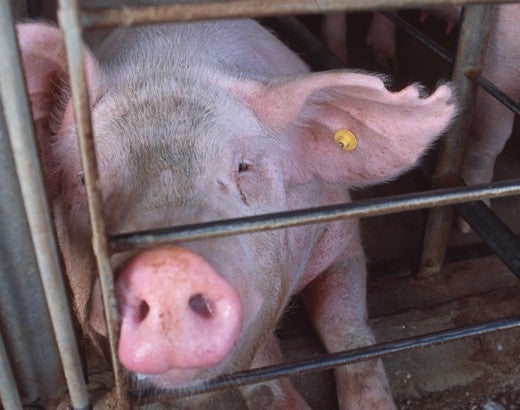Every now and then an individual animal’s story captures worldwide attention and brings the pains and paradoxes of our relationship to other species into stark relief. We saw this with Cecil, Harambe and Lolita—animals who became famous because of their tragic fates. We saw it last month with a wild wolf captured, tormented, and killed by a man in Wyoming. Each of these stories shines a spotlight on not only the animals and their plights but on who we are and how we should aspire to be. And most recently, a dog named Cricket, who was killed two decades ago, has become the subject of another such story.
The account of Cricket’s death shows up in Gov. Kristi Noem’s political memoir. Noem was using Cricket, just 14 months old, as a hunting dog. But when Cricket got loose, attacked a neighbor’s chickens, and nipped at Noem as she retrieved him, she decided to take him to a gravel pit and shoot him dead. “I hated that dog,” Noem wrote, who used the same occasion to shoot a goat that she also didn’t like. The goat lay there wounded and suffering, while she walked back to her truck to reload her gun and returned to finish him off.
In neither case did Noem show any doubt or remorse; quite the contrary, she sought to cast her action as a signifier of tough-minded realism that would burnish her appeal as a politician from a rural community.
She badly miscalculated the effect of her demonstrated lack of compassion, one that came with an admission of “hate.” So many of us share our homes with dogs, many of these dogs have had to be trained and coached through their wild misbehaviors, and we have seen ourselves as obligated in turn to show them understanding and patience, much as we do to members of the family who are young or going through difficult times. Shooting the puppy in the gravel pit is a total betrayal of this bond.
Cricket’s death made headlines even before Noem’s book came out, and shocked readers from across the political spectrum and across demographics, including those of urban and rural. It’s rare these days to find an issue that unites people across differences so strongly, but pretty much everyone recognized that what Noem did was wrong, even if she so clearly did not. Treating animal life as so disposable is a shocking repudiation of the kind of relationships that so many of us have experienced with animals, regardless of their misbehaviors.
That is to say, Noem's betrayal was larger in scope than the wrong she committed against Cricket and the goat. Noem shirked a more general obligation that has wider political, social and cultural implications: to be steadfast in drawing on any resources possible to help solve conflicts and better the lives of those who are vulnerable, rather than simply giving up on them. In shooting her animals so carelessly and callously, and then bragging about it, she was also, politically speaking, shooting herself in the foot. For The Hill, we explored the moral and political implications of Noem’s act, seeking to broaden the readers' scope to more systematic cruelties in which all of us play a part, and mentioning, too, some vital current federal legislation that would make life markedly better for animals in need, and a dangerous development in Farm Bill deliberations.
Americans of all stripes care deeply for animals, especially the companions with whom they share their homes and lives. Domesticated animals, from dogs to goats, and our relationships with them help bring out the potential for compassion that everyone is born with. As Noem betrayed the role she had as the owner of animals and as a public figure, we felt it our duty to comment on these deaths.
In an ideal world, no animal would have to die just so awareness can be raised. But our world is far from ideal, and sometimes it is public outcry that shifts a paradigm. After Cecil’s death, we saw more and more people around the world call for an end to trophy hunting. Harambe’s death and Lolita’s plight led to greater recognition of the wrongs involved in keeping wild animals such as gorillas and marine mammals captive for public spectacle. And with the Wyoming wolf killing, we saw a particularly appalling example of the heart-wrenching and reckless cruelty that some people still inflict on native wild animals and how little some individuals and some state agencies value our wild neighbors.
It is a hard fact that animals suffer and are killed as a result of human actions all the time. And yet, none of us can easily fathom the scale of animal pain and misery that is so systemically woven into so many areas of our society. To change the root causes of this cruelty means changing whole systems to reduce animal suffering and use. But it means much more, because ultimately, so much of our work for animals is about forging solidarity with others who, while they may differ from us in many viewpoints, also believe we have an obligation toward caring for animals.
Our movement for animals has made immense progress only because we have formed relationships and coalitions with the aim of creating a better world for animals, one that is more compassionate and more hopeful for future generations. We are dedicated to reaching across all kinds of barriers to connect with everyone who understands the urgency of aiming for such a world. Every now and then a story makes us face up to how much farther we have to go, but also how universal the values are that will help us get there.
Sara Amundson is president of the Humane Society Legislative Fund.



